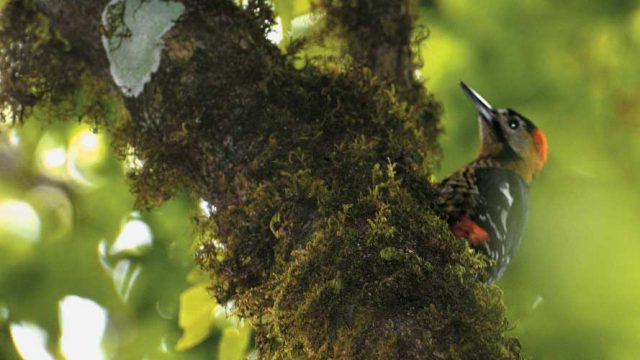Barsai Rhododendron Sanctuary spreads across the Singalila Range, which forms the natural international border with Nepal. In the south, the Rambong Khola separates it from West Bengal. The sanctuary forms a vital corridor connecting the Khangchendzonga Biosphere Reserve in the north with the Singhalila National Park in West Bengal in the south. The site contains several forest types, such as subtropical deciduous, sub-alpine, moist and wet temperate.
July is the wettest month in the sanctuary, with average annual precipitation of 250 cm. The reaches above 2,500 m receive snowfall annually. About 600 varieties of rhododendrons, out of the 1,000 known varieties in Sikkim, are found in this sanctuary. It is also home to the rare Himalayan red panda and black bear. Meadows take over from above 4,000 m and are rich in medicinal plants.
The Barsai Sanctuary can be reached from three points, Hilley, Dentam and Soreng. The most popular point of entry is Hilley, which can be reached by road, after which Varsey is a short, and absolutely fulfilling, 4-km trek via a beautifully laid gravel path shaded by many species of rhododendrons. The bridle path heads due north along the Singalila Ridge, with views of Kangchenjunga. The gradual climb will take no more than an hour and a half. While it is possible to leave Hilley early in the morning and be back by lunchtime, it is certainly more fun to stay at Barsai for a night to catch the views and enjoy the rhododendron forest.

Hilley is located 77 km away from Namchi, via Sombaria and Jorethang. Only hired taxis will go all the way to Hilley; shared taxis and buses go up till Sombaria, which is some 100 km away from Hilley.
Wear heavy woollens, snow shoes, gloves, caps and carry sleeping bags during winter months; light woollens during the rhododendron blossom months – also remember to carry raincoats and umbrellas. Entry permits can be obtained from the Wildlife Checkpost at Hilley.
Park Entry Indians ₹50 per day; Foreigners ₹100 per day Photography ₹200 per day Videography ₹400 per day
Stay at the Guras Kunj (Cell: 09800398309, 09593882002; Tariff: ₹600-900 per person, with meals), in Barsai, amidst the rhododendron forests. They put up tents as well.
When to go March-April, the blooming season is the best time to visit Location It is spread across the Singalila Range in West Sikkim Air Nearest airport: Bagdogra Rail Nearest rail: New Jalpaiguri, Siliguri
THE INFORMATION |
Tourist Offices Sikkim Tourist Information Centre MG Marg, Gangtok, East Sikkim Tel: 03592-209090 |
Sikkim Tourist Information Centre Tourist Lodge, Rangpo, East Sikkim Tel: 03592-240818 |
Sikkim Tourist Information Centre Below Dak Bangalow, Alley Road Namchi, South Sikkim Cell: 09900724673 |
Sikkim Tourist Information Centre New Sikkim House 4/1, Middleton Street, Kolkata Tel: 033-22817905 |
Sikkim Tourist Information Centre Bagdogra Airport Bagdogra (West Bengal) Tel: 0353-2698030 |
Sikkim Tourist Information Centre NJP Railway Station New Jalpaiguri (West Bengal) |
New Sikkim House 14, Panchsheel Marg Chanakyapuri, New Delhi Tel: 011-26115171 W sikkimtourism.gov.in |
Permits – Foreigners need an entry permit to visit Sikkim, which can be obtained from all Indian Missions, Sikkim Tourism Offices at New Delhi, Kolkata, District Magistrate’s Office at Darjeeling, Siliguri and Rangpo on the strength of an Indian visa. For details, check W sikkimtourism.gov.in |




